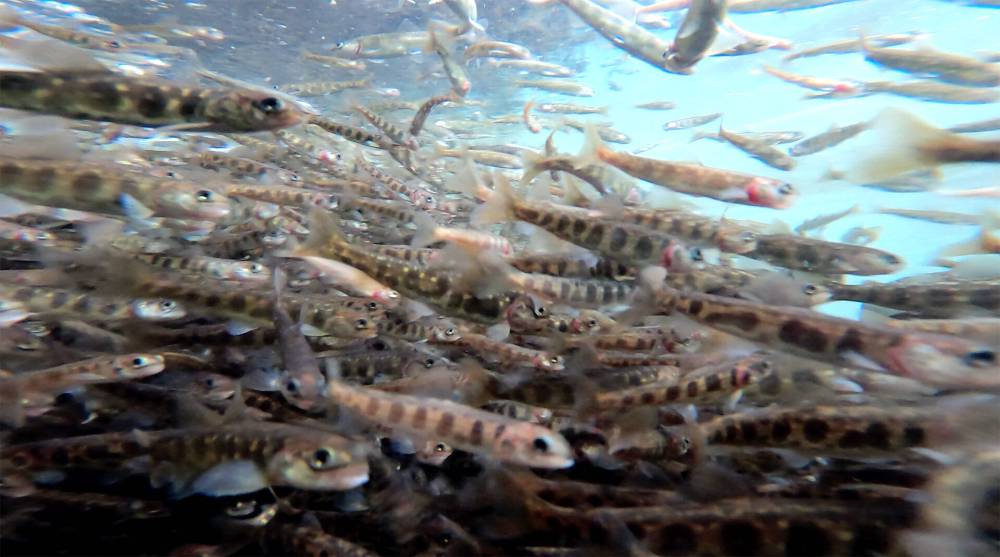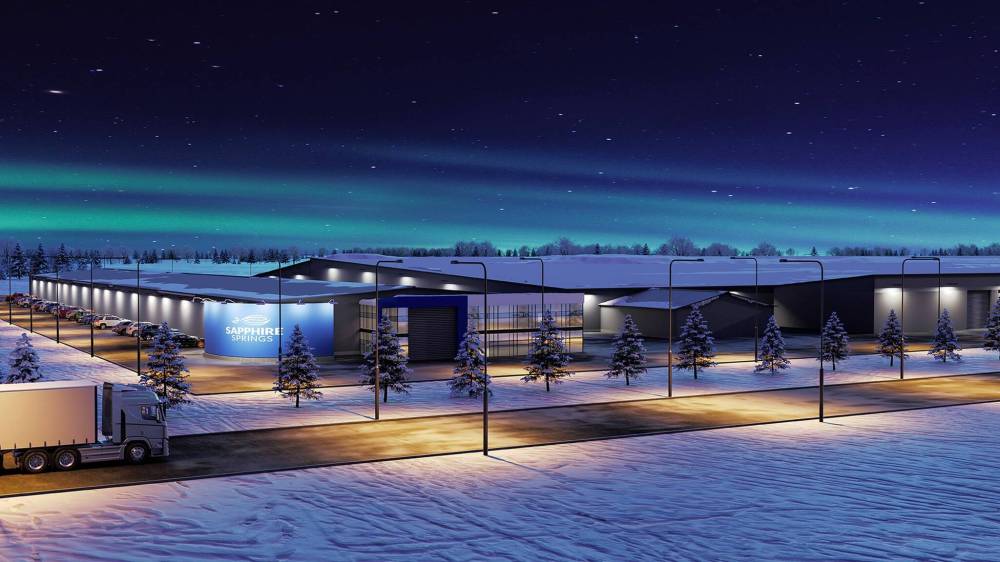[ad_1]
Arctic char has been a favourite local delicacy in Manitoba for a long time. But supply is always limited.
In a couple of years that might change as a new Manitoba venture near Rockwood is under construction that could increase the global supply of Arctic char by a whopping 50 per cent.
Sapphire Springs Inc. (SSI) is building a $140-million aquaculture facility that will produce 5,000 metric tonnes of the fleshy fish that is part of the salmon family — but represents only one per cent of the global market for salmon — when the plant is up and running by early 2027.
SUPPLIED The site will be the largest land-based aquaculture facility of Arctic char.
The company — a partnership between seven Manitoba entrepreneurs, led by Chuck LeFleche and Ken Blair — has been working on the project for three years. They are using a form of land-based aquaculture called recirculating aquaculture system (RAS) that re-uses almost all of the water, recirculating it back cleaner than it was before.
With global fish stocks at risk and the oceans over-stressed, and traditional fish farming often the subject of poor market acceptance, many believe RAS aquaculture to be an excellent alternative.
According to the Food and Agriculture Organization of the United Nations, aquaculture will need to supply two-thirds of the world’s seafood by 2030 as the world’s population continues to climb along with the demand for fish.
The site of the development — which is three-quarters built — is an old Fisheries and Oceans Canada research station and hatchery near Rockwood. It uses water from a one million year old aquifer, the temperature of which happens to be exactly suitable to the species of Arctic char that it will be raising.
LeFleche, the former CEO of the St. Boniface Hospital Foundation and an entrepreneur who’s been active in the information technology and biotech industries, said fishery experts have indicated the conditions are ideal for raising this species of Arctic char.
“Among other the things, the beauty is we don’t have to wait for a fall harvest,” said LeFleche. “We’re going to be producing 6,000 fish per week. There will be a semi-trailer loading up every day.”
Justin Henry, a world leader in RAS technology based in Vancouver — he built one of the first such systems in Canada in 1998 — has recently signed on to become part of the SSI management team.
“I have been working with these systems for many years with a variety of species and believe it is an excellent way to grow fish,” he said. “SSI has a location and ground water that is ideal for this project and they have a species that is unique and high value and there is not a lot of it out there.”
Henry notes that while there is risk involved in any type of agriculture, the RAS technology is able to eliminate the risk for things like poor water quality, pathogens, predators, storms, low oxygen levels and high water temperatures.
SUPPLIED Sapphire Springs Inc. is building a $140-million aquaculture facility that will produce Arctic char when the plant is up and running by early 2027.
“It is a trade-off,” he said, “You may now have the risk of human error or mechanical failure but those risks can be managed with backup systems and proper training. All of that becomes even more important as water and ocean temperatures increase and water quality conditions are changing. In this system you can make ideal conditions every day of the year.”
SSI has had all sorts of interest both from potential customers including most of the major fish distributors — LeFleche said one of them made a pitch to be the exclusive distributor — as well as from the capital markets. LeFleche believes there will be no trouble selling the product.
Peritus Capital, a New York venture capital firm, specializes in the global aquaculture industry. It has been managing SSI’s capital requirements, organizing bank financing and helping the company access funding available through federal and provincial sources.
Howard Tang, the CEO of Peritus, is an expert in the field. He said there are not a lot of RAS facilities like the one in Rockwood. He said while there are never any guarantees when it comes to financing such enterprises he is confident about the interest SSI has generated.
“SSI will accomplish two things,” he said. “First: they will be at a scale and scope that will probably make it one of the largest land-based aquaculture facilities in the world and it will the largest one for Arctic char.”
On Friday, the company received some potential new funding news with an announcement that a re-elected Progressive Conservative government would sink $20 million into fish farming in the Interlake.
On Friday, Steinbach candidate Kelvin Goertzen said the aquaculture sector can count on the Tories to flow cash to the industry if they win the election on Oct. 3.
“Manitoba is on the cusp of great things,” Goertzen said in a news release. “Industries are booming, companies are growing, new jobs are being created, and we see much more economic activity on the horizon.”
SUPPLIED Chuck Lafleche
Provincial funding for the project might not be considered a big risk, considering the sizable economic impact the 100-person operation will generate.
The operation is forecasting to generate close to $100 million in annual revenue producing about $25 million in total annual taxes.
The company is just about to register with the province’s Small Business Venture Capital Tax Credit, creating the opportunity for qualified Manitoba retail investors to participate in the business.
— with staff files
martin.cash@freepress.mb.ca

Martin Cash
Reporter
Martin Cash has been writing a column and business news at the Free Press since 1989. Over those years he’s written through a number of business cycles and the rise and fall (and rise) in fortunes of many local businesses.
Read full biography
[ad_2]
Source link

